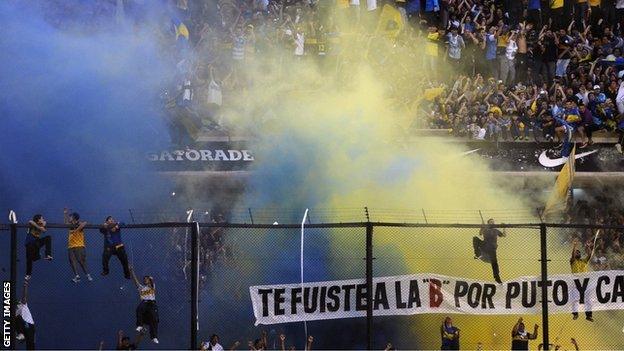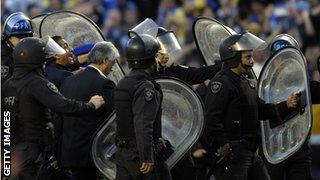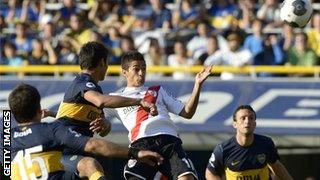Tim Vickery column: Violence mars Boca-River superclasico
- Published
- comments

Crowd violence and objects raining down from the stands marred the second half of the Argentinian "superclasico" - one of South American football's big showpiece occasions - between Buenos Aires sides Boca Juniors and River Plate on Sunday.
Fans set off fireworks, tossed flares at players, and climbed a steel fence separating the stands from the pitch as officials struggled to retain control of the match.
River coach Ramon Diaz was sent to the stands escorted by riot police for allegedly insulting the referee.
Security forces responded, pounding fans with a high-pressure water hose to restore some sense of order and to allow the match to conclude.
The game had got off to a cracking start. River's goal after 43 seconds was apparently the quickest in the history of this great rivalry.
They should have scored more, with their opponents wide open to the counter-attack, but Boca scored a well worked equaliser on 38 minutes, and a pulsating first half ended all square.
But there was little that was memorable about the second half - on the pitch, anyway.
The game was held up for six minutes, with Boca fans lighting fires and threatening to climb over the fences. There was another two-minute delay near the end, with objects and noise bombs being thrown at the River goalkeeper, and so as the atmosphere in the stands bordered on anarchy, the match petered out as a spectacle, ending in a 1-1 draw.
It is a grimly common scene - objects thrown on the pitch, games ending early, because of what are usually referred to as "incidents". The authorities shrug their shoulders as if all this were as inevitable and unchangeable as the weather.
Last week there was a change at the top in Conmebol, South America's equivalent of Uefa. After 27 years as president - the longest term in the organisation's history - Paraguay's Nicolas Leoz stepped down.

River Plate's coach Ramon Diaz is escorted off the pitch by police after he was dismissed by the referee
He said he was resigning on health grounds - and at 84 with a history of heart problems it is not without justification. But the timing clearly has everything to do with the release of the verdict by the Fifa ethics committee on the ISL bribery case.
Leoz escaped the condemnation heaped on the Brazilian pair, Joao Havelange and Ricardo Teixeira, but his conduct was described as "not fully candid", and his position had clearly become untenable.
As he left the Conmebol presidency, the organisation paid tribute to the way Leoz had "permitted the integral growth and development of South American football". The words are not mere smoke. For all his faults and his little vanities, Leoz has made a contribution. He was an excellent conciliator. Taxi drivers in Asuncion were forever lamenting to me that he was not the president of Paraguay.
His successes can be put down to two major factors. First, when he came to power in 1986 the continent was moving away from its dark age of military dictatorships. There was a climate for more continent-wide co-operation.
The second factor was the rise of television as a major player. All of the triumphs of Leoz were in partnership with the TV companies.
First, there was a revival of the Copa America. The world's oldest continental tournament had fallen into disuse until it was brought back in 1987. It has since been taken around all the countries - being staged in Paraguay, Colombia and Venezuela for the first time ever.
The second was the introduction in 1996 of the "one big group" system of World Cup qualification, with all 10 of the continent's nations playing each other home and away. At last this gave the less traditional countries the type of calendar the Europeans take for granted, with regular competitive games.
And then there was the expansion of the Copa Libertadores, the continent's premier club prize. Thirty two teams is the ideal number, and with a competitive group phase followed by the knock-out rounds, the structure is sound and easy to understand.
These are concrete achievements of the Leoz reign. But there is plenty on the debit side as well. There is, as we have seen, an inability or unwillingness to get to grips with the problem of supporter behaviour.

River Plate's midfielder Manuel Lanzini heads the ball to score after 43 seconds
Also, there have been no advances on the financial side; no mechanisms to ensure that clubs pay their players on time, for example.
And, crucially during the era when the global market opened up and South America became a large scale exporter, there has been no crackdown on player registrations, or anything else to halt the party of agents and investors, who take advantage of the weak position of clubs to acquire a stake in promising players. When these are sold, too much of the money leaves football.
To be fair, Conmebol cannot be Uefa - because South America is not Europe. The difference is much more than financial. It is geographical, historical and political. Europe's countries are close together, with strong trade ties going back centuries, and have been frightened into co-operation by the dangers of war.
Distances are vast in South America, where the nations have traditionally been providers of raw materials for the first world rather than trade partners.
Some 200 years ago Simon Bolivar launched a war for South American independence while nourishing the dream of a free, united continent. By the end he was more bitter. "South America is ungovernable," he exclaimed. "Those who made the revolution have ploughed the sea."
The tasks ahead remain difficult. But in a continent with an unrivalled football tradition, one which was able to organise its first Copa America as far back as 1916, it is impossible to watch the scenes in the second half of the Boca-River match without concluding that there is massive room for improvement.
Send questions on South American football to vickerycolumn@hotmail.com and I'll pick out a couple for next week.
From last week's postbag:
Q.How has Alexander Pato acclimatised to being back in Brazil? I see that he made an assist for Neymar's goal against Chile - is his inclusion for the Selecao a result of a return to form or is this Big Phil still taking a look at the pool of players he has at his disposal?
Mzamo Moloi
A. The most important thing is that he's back playing. Brazil's physical preparation specialists are world renowned, and they appear to be doing a better job than was done at Milan in terms of keeping him fit.
Scolari has had a look at him as a half time substitute in the two recent friendlies against Bolivia and Chile. The move for that goal against Chile that you mentioned was wonderful - highlighting the fluidity and intelligence of his movement, and his vision and unselfishness in the box.
In general, though, Leandro Damiao did much better than Pato during the first halves, and seems more suited to the lone striker role in Scolari's 4-2-3-1 formation. For these players, as for everyone in the squad, the Confederations Cup is going to be important.
Q.Last week, you touched on the fact that Brazil is struggling to produce passing midfielders.
But is this not also true of the current situation in Argentina, where there has not been a credible successor to Juan Veron? Is Argentina's case down to a change in philosophy or the decline of the domestic championship?
Raf Diallo
A. The standard of the Argentine championship has clearly declined sharply - Maxi Rodriguez was quick to notice this after returning from a decade in Europe. The motives? Plenty! Endless selling, much of it premature, and a concentration on running and athleticism in the belief that this makes players more attractive to Europe. Plus the hysterical lack of patience from the terraces.
The national team, however, still have at its disposal the excellent products of better times, especially for Argentina's Under-20s. In Argentina's recent good run, Lionel Messi has clearly been the outstanding player. But the second best has been Fernando Gago, a midfielder who links the play so well. Indeed, more often than not, he is Messi's supply line. And there is Ever Banega in reserve, a wonderfully gifted passer of the ball. So all is not lost.
- Published29 April 2013
- Published22 April 2013
- Published8 April 2013
- Published1 April 2013
- Published25 March 2013